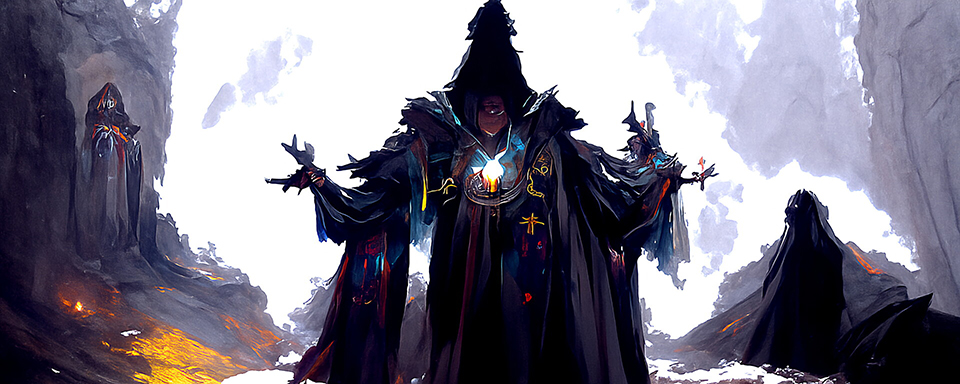
Kraag Stonefist watched with disdain as the workers slowly left the fields as the sun worked its way down past the horizon. When the sun reached halfway past the horizon in the morning, they would all have returned to start the next day and they would work until the sun was halfway past the horizon. It was long hours working in the farm fields, but the Mage Lords paid them a wage for the work they did. It was enough to live off.
The workers would collect their daily wage of three copper, have a small meal of porridge and beer, which cost two of the three copper they earned, then spend an hour conversing with their fellow workers before heading to the small huts they lived in to relish what sleep they were able to get while dreaming of a better life. The next day, they would awaken and repeat the process. All the while hoping they did not falter or lose the strength to work another day.
Once each month, the Mage Lords would send a caravan with basic supplies to be sold to the workers for any wages they had managed to preserve during the month. Basic needs like clothing and shoes, perhaps a small toy or a sweet treat for a child, a bottle of mediocre ale were made available by the Lords’ grace. The prices were often reasonable, if not specifically low, as a means of keeping the workers in a constant state of poverty and obligated to continue to work the fields each day.
Not every day was like this, but it was planting time and the lords always pushed the workers hard during the season. The more they planted, the more would grow, the more they would have, and the Mage Lords were not accustomed to going without. This was not everyone’s life in Thuld, but for many this was all they had; a life of menial labor making a subsistence wage while the Mage Lords reaped the profits and lived in luxury.
Kraag and his fellow gargoyles kept watch over the fields. They ensured none of the crop got stolen, no monsters attacked and tried to eat the workers, or, more importantly, damaged the crop. They ensured the workers kept pace, and any found slacking often discovered that they did not have work the next day. It was not a glorious job, but it was their duty to serve the Mage Lords and guarantee the prosperity of Thuld for the good of all. After all, that is why the Mage Lords created the gargoyles: to serve and protect the empire.
Some of the gargoyles had rebelled against the Mage Lords, claiming that they were not created by Thuld and that they should rise above the cruelty of the magocracy. Whispers of freedom from the mages’ oppression would occasionally whisper through the ranks of the guardians, but they were quickly squelched. Kraag and his fellow gargoyles had everything they needed. They had a purpose, they served, they protected, and they lived a modest life from their work. Freedom from work was not only a deception of the rebels, but it meant fleeing everything they knew, being hunted by the gargoyles who remained loyal to the mages, and trying to eke out an existence in the cold wastes of the frozen mountains. Kraag was perfectly content to enjoy his small home, his three meals each day, and the safety and security provided by the Mage Lords.
Once the fields had been planted, several of the Mage Lords’ lesser mages would visit the fields and perform the growing ritual. This process usually took several days, during which time the workers were not paid, but were provided food and shelter. During the growing ritual, the seeds which had been planted would be magically encouraged to rapidly grow. What would take months by natural means, the mages of Thuld accomplished in days, and the workers would spend the next several weeks harvesting the crop. If they were lucky, it would be a food crop and each day a small portion of the harvest would be provided to the workers.
Crops of hemp, cotton, bamboo, and various foods were the standard returns on these large fields. These are the items that kept the mageocracy operating, and would be exported as needed to acquire the raw materials that magic could not replicate, which Thuld had already depleted within its own borders, such as traded to Cyngar for precious metals, iron, and stone or to other kingdoms and individuals for gold and valuables.
All this commerce is conducted primarily to fund the personal mana fruit fields that each Mage Lord maintains. Mana fruit is considered the most valuable resource in Thuld. Mana fruit is unique in several ways. First, it is unaffected by the magical growing rituals used to encourage other plants to grow faster. Mana fruit can only grow naturally. Second, mana fruit is infused with magical energy and can be used to create various magically infused items. Anything from wine that will restore magical powers to exhausted mages, to potions with restorative powers, to inks which can craft the most potent of scrolls. The uses of mana fruit are still being unlocked, but only the most powerful of the Mage Lords have access to it in any quantity. Thirdly, mana fruit only grows in specific locations. Scholars have been unable to determine what causes mana fruit to grow where it does, but these locations have become the most valuable and well-guarded locations in the empire.
The Mage Lords who control the mana fruit groves guard them jealously and never export mana fruit. To be gifted a mana fruit is a great honor among Thuld and one which is very rare. Occasionally, Mage Lords who are in dire need of coin or other resources will trade or sell their mana fruit, although it is far more likely for them to sell or trade the goods crafted from the fruit instead of the fruit itself.
Stealing from a mana fruit grove is punishable by death. Damaging a mana fruit grove results in a punishment far worse than death: a ritual known as the Spirit Shattering. It is thought that the ritual shatters the spirit within the body, causing the individual to live in a state of constant emotional and sensory-dulled death, a hollow shell of the being they were and suffering from regular mental anguish that nothing relieves. They no longer see bright colors, food tastes dull and boring, everything smells lackluster or foul, any touch causes them piercing pain, and their ears are unable to perceive songs or music of any kind.
The Mage Lords of Thuld maintain a firm grasp on the lands they each control, but they also recognize the need for larger governance. As such, they founded a senate of mages, a body of political governance that comprises any land-owning mage within the borders of Thuld. All members of the senate are equal in the sense that they each hold one vote, but the less powerful lords are often coerced to vote in favor of one of the more powerful lords. This system allows the magocracy to operate as an empire, while being more akin to a coalition of provinces that agree to follow a few overarching laws.
Participation within the senate requires all members to sign a magical contract which binds them, at least loosely, to the laws that are enacted by the senate, and requires an annual tithe which is used at the discretion of the senate for the betterment of Thuld, such as maintaining a military, ensuring trade routes are maintained, and opposing the publicly denied gargoyle rebellion.
Thuld is an oligarchy in every sense of the word. A small number of individuals, the Mage Lords, have almost complete control over the empire. Between them, the Mage Lords hold considerable power, which they wield for the betterment of themselves, most often through magical advancement. Many of the Mage Lords have advanced their magical practice over the centuries thanks to magically prolonged life spans. As such, many of them have amassed large fortunes of wealth, influence, magical items, and loyal followers. It has been surmised by several scholars that the Mage Lords of Thuld are, or are on the verge of, evolving into a new species tied so heavily to magic that they in fact subsist directly from or off it, not unlike how vampires live off the life force of other living creatures.
Within Thuld, no magic is outlawed and everyone is welcome if they follow the laws. Necromancy, Warlockery, and Witchcraft are practiced as openly as Destruction, Protection, and Dream magics. No magic is considered unworthy or lesser, at least legally speaking. Each individual Mage Lord will, of course, espouse the greatness of their favored types of magic over the others, but within its borders all magics are equal before the law and they are all used to varying degrees as needed to advance, enhance, and protect the borders and interests of Thuld.
This of course brings up the question, why would anyone stay in Thuld if they are in fact free people? While the above information certainly paints a two-sided picture between the Mage Lords who have vast fortunes and the common worker who toils in the fields, Thuld is much more than this depiction would make it out to be. These are simply the two extreme ends of the spectrum. Within Thuld, there exist craftspeople, independent farmers, cobblers, bakers, tradespeople, soldiers, mercenaries and almost every profession you will find in other countries.
For most people, life within Thuld is not bad and many don’t understand, or have the wealth to change where they are and simply do not concern themselves with the activities of the Mage Lords. The largest exception to this is the gargoyles.
Rumored to have been created by the Mage Lords of the senate to serve and protect them from threats, Thuld has a substantial gargoyle population, each of them aligned to a Mage Lord family. The gargoyles of Thuld are prized guardians of each Mage Lord. They are powerful soldiers, staunch protectors, and loyal servants. In some lands, they are trained exclusively as soldiers, in others they are taught to act as stewards over the lord’s lands and holdings, and in others they are little more than servants who are expected to do anything asked of them by their lord. The one immutable law of Thuld is that no gargoyle shall be allowed to learn magic.
Some would say that the gargoyles are enslaved to the Mage Lords, and while it may appear that way from outside the country, it is in fact untrue. Gargoyles are free to come and go just as any other person, they are compensated for the services they provide their lords, and they are provided with a modest lifestyle, some would say extravagant compared to the average farm worker. It is considered a great dishonor among the gargoyles to be unaffiliated with a lord’s house and, as such, it is very rare that a gargoyle leaves the employ of one Mage Lord to join another. It does happen from time to time, especially in the unlikely event of a Mage Lords’ death.
According to Thuld, and those gargoyles loyal to it, the gargoyle rebellion is nothing more than a farce started by a few upstart gargoyles who betrayed their lord and could not find work with another. The very notion that these malcontents have begun spreading rumors that the first gargoyles did not come from Thuld is sheer insanity, and it is well known among the loyal gargoyles that for them to reproduce they require the aid of mages, which the mage lords have quite happily provided.
As one loyal to Thuld, Kraag would continue to honor his sacred duty to his Mage Lord and ignore the whispers, the stray thoughts that came unbidden in the few moments of rest he found. Thuld would provide, as it always had. Home, security, purpose were within the kingdom. Outside, only struggle and Last Repose awaited. Only whispers of a time before Thuld. That, and nothing more.

